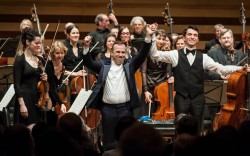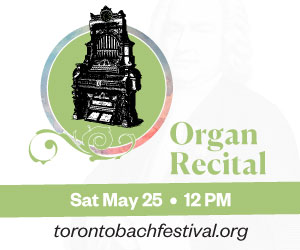Concert Review: Jacques Israelievitch and Christina Petrowska Quilico CD Launch
“You never know where you're going to meet a composer.”
Jacques Israelievitch was introducing Duo for Violin and Piano by Oscar Morawetz at the Canadian Music Centre on June 11. The occasion was the launch of the Centrediscos CD Fancies and Interludes, a collection of four 20th-century works by established Canadian composers recorded live at York University where both performers, Israelievitch and Christina Petrowska Quilico, are members of the faculty.
“On the subway or even ringing your doorbell.”
He was remembering the moment in 1988 shortly after he and his family moved to Toronto from St. Louis. He was about to begin his 20-year record run as TSO concertmaster when Morawetz appeared on his doorstep, music in hand. The composer presented the concertmaster with his Duo.
Later, Israelievitch took the score to his music room with its 90-odd boxes of carefully catalogued scores. Under “M” he found it, the same Duo, but autographed by Morawetz to Josef Gingold, the legendary concertmaster under George Szell in Cleveland and influential pedagogue at Indiana University. Israelievitch studied with Gingold, later becoming his teaching assistant. Duo (1951) was one of many scores Gingold did not have time to learn, scores which he passed on to his student.
Israelievitch played the piece with elegance and strength, bringing out the music's eloquence. He was aided by Petrowska Quilico's considerable support on the piano.
Earlier the violinist talked about passing the time while riding the subway in Chicago by studying the full score for Hindemith's Octet. A seatmate peered over his shoulder and asked if the score was by Hindemith. Surprised, Israelievitch engaged him in conversation, discovered he was a composer and within four stops had commissioned a piece from him. Three weeks later, Israelievitch's apartment bell rang and over the intercom he heard the words: “I'm the composer you met on the subway. I have your commission.”
After the Morawetz, Israelievitch and Petrowska Quilico played James Rolfe's Drop (1998) which combined percussive and repetitive keyboard writing with tentative, quasi-lyrical violin passages. Filled with referential phrases that often seemed familiar, the work ended with Israelievitch alone, a few quiet touches of the bow tenderly playing on the strings, the sound dropping reluctantly on the ears of the audience that crowded the CMC's first floor.
A heartfelt standing ovation followed. The violinist said simply: “I hope you enjoy the CD.”



